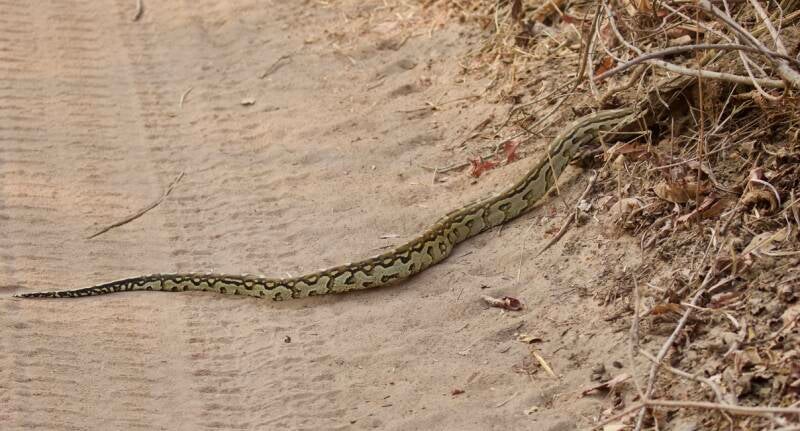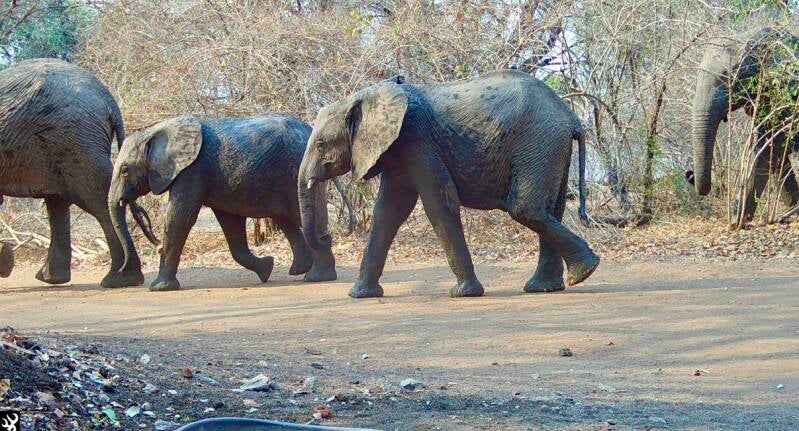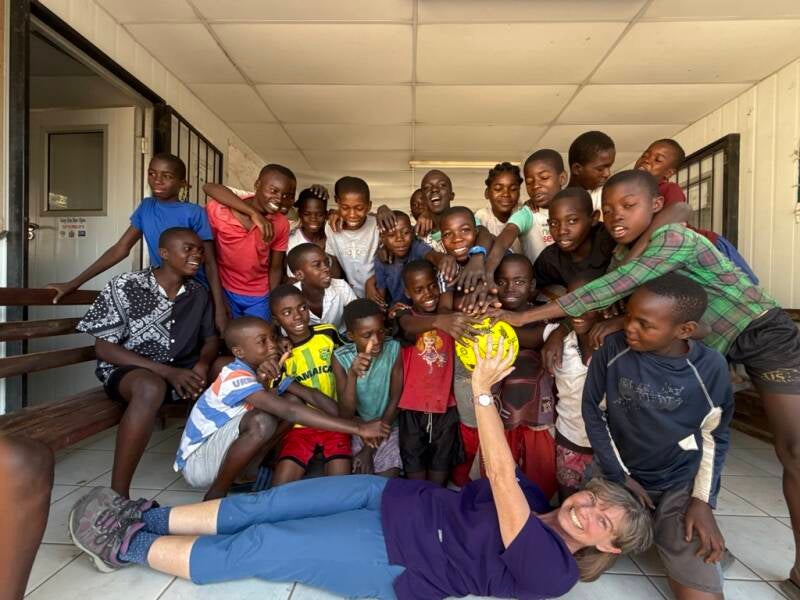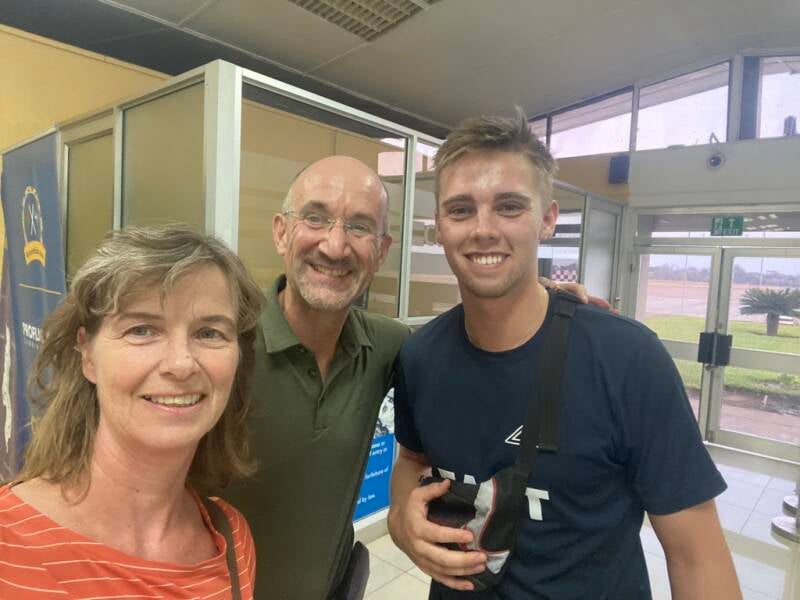
Photo of the week: a young python hiding his head in the sand
Highlight of the week: We jointly retain the Silver stool award for 13 weeks1
Lowlight of the week: Joel leaves us for fresh adventures, starting in Livingstone.
Maximum temperature: 45 degrees Celsius
Rainfall: Some in Tafika – 2 hours north of us
Drip, drip, drip. The Chinese water torture of our ailing air conditioner in the wee small hours. Keith jumps up. He saves our bedroom furniture with prompt action. The air conditioner goes off. The fan goes on. At turbo power. The drip stutters and stops. The fan blows the skitters hard against the outside of our bed net. Mrs Mosquito’s night time campaign fails. Fans at night become the new normal.
Gastroenteritis. Diarrhoea and vomiting. A gruelling ailment that sustains our practice, yet drains us personally. Best avoided. Fluid issues from both orifices without invitation. Drip, drip, drip. Fluid issues are the main way of managing our unfortunate patients. A worldwide affliction that challenges high income countries too. But in low and middle income countries, poor access to water and excess heat often add insult to injury. Zambia has more than its fair share of D&V. Children can get super ill, super quickly. Early pick up and early hydration keep the Grim Reaper at bay. Dehydration a killer. On a background of marginal nutrition and chronic worm infestation. We have to be on our toes.
My ward round at Velos this week is a slow burn. I arrive on the ward at 09:30. Helen, the nurse in charge, is delighted to see me. She readies the trolley for the ward round. Looking at me expectantly. But that is not the deal I have made. I am not here to do ward rounds by myself. I am here to support. Teach. Encourage good practice. I decline to start the round. Let’s wait for the team I suggest. Whilst waiting: I take the opportunity to review the notes. We have 5 children to see. The first is in bed one. Beds 1 and 2 are nearest the nursing station. These beds have piped oxygen. The sick kids get put here. I see a bundle of blankets on bed one. A little mite, Martha, wrapped up in them. Mum is expressing breast milk into a small container. I read the notes. A 5 month old baby. Weighing 4.5 kg. Drastically underweight. She presents with diarrhoea and vomiting. Assessed to have severe dehydration. Her malaria test negative. An IV cannula is inserted. She is given some IV fluids overnight. But the IV is no longer running. She has no fever. Her heart rate is a little fast. Everything else is pretty normal.
Martha’s mum has expressed a full bottle of milk. But it sits idly on the bedside cabinet. For 45 minutes. Until our round kicks off. No fluid passes Martha’s lips. No drip, drip, drip. No life fluid imbibed. No fuel to the carburettor. But at 10:15 the throttle is engaged. My slow start finally speeds up. Misheck, the clinical officer, arrives. Martha is our first patient. Bed 1 seems a good place to start. Martha’s thirst needs quenching.
Martha’s story is reviewed with mum. We are relieved to learn that the baby has not vomited since 02:00. But she has had 4 loose watery stools since then. She looks sleepy. With a dry mouth. The soft spot on top of her head is sunken. Her fontanelle is a window into the water pressure inside her head. Her skin is loose. Very dehydrated.
Mum tells us that Martha is too sleepy to go on the breast. She does not have the energy to suck. What’s your plan team? I enquire. Misheck says that they will put up more IV fluids. Shall we just try some oral rehydration solution (ORS), pang’onopang’ono? The Nyanja word is a challenge for me to say. But it helps to say it slowly. With an open mouth. Slowly, slowly. My plan is met with withering looks. She is too sick to feed. She has no energy. But Martha’s open mouth mirrors mine. Surely she will want to quench that thirst.
I reach into my bag and find a 5 ml syringe. I fill the syringe with ORS. I put it into her mouth. Martha’s first reaction is to turn away. But then she takes more interest. I slowly push the ORS into her mouth. She gives a weak cry and starts to swallow. The syringe empties quickly. I refill it and repeat the process. She swallows more keenly. But I stop. Do this too fast and Martha will vomit. I give our nurses instructions to give her one syringe every 5 minutes. That’s one millilitre per minute. 60 millilitres in an hour. We share the plan with mum and get her involved. And then move on to bed three. We tell mum that we will see her again shortly.
Playing Shithead2 with beds, we miss out bed two. It’s empty. Waiting for another touch and go child. A child who would have to be perilously ill. Bed 2 is strategically vacant. Bed three usually holds, by definition, a less sick child. But bed 3 is also empty. Nathan is 2 years old and is up and running around. He came in with severe malaria, 2 days ago. Two days of treatment sees Nathan off the critical list and ready for discharge.
At this point I glance back at bed one. I have been watching Mum struggling to take the lid off a sugary yoghurt drink. I assume, in error, that she is going to give herself an energy boost. Unhealthy for her in the long run, but at least this drink could keep the wolves from her door today. Once the lid is off, to my horror, she starts giving the yoghurt drink to baby Martha.
Our game of Shithead jumps back the way. Back to bed one. I insist that mum needs to be taken to task. We find the smoking gun. And the fastest gut in the South is explained. Martha’s gastroenteritis links to poor feeding practices at home. Babies should be exclusively breast fed in Zambia until 6 months of age. It is impossible to sterilise bottles here. All the nutrition they need is present in breast milk. From a clean package. Kept safely at body temperature.
Mum admits that she has been giving baby Martha yoghurt and porridge. The confession clears the air. The maxim that mother knows best only applies when education is a birth right. And that is not yet true here. Somehow Martha’s mum thinks that yoghurt and porridge are better than her own milk. The milk that she has so patiently expressed and kept to one side. She gets a good talking to. Sorry let me reframe that: She has a guided conversation to better understand the impact of her health decisions. Education. Encouragement. Support.
We finish the round by 11:15. I return to bed one. Mum has given all the expressed breast milk to Martha and is now expressing some more. She has also given the baby 8 syringes of ORS. Martha is alert and looking around. Two hours ago she was deep in a perilous jungle full of invisible pathogens. Now she is still amongst the trees. But she is at least on the right track. The track that leads back to the safe plains. Away from the bugs and unsafe waters. Unsafe water is replaced with safe water. Breast milk and ORS to be precise.
Fast forward to Wednesday. Our clinic day in Kakumbi. The day starts slowly. The computer system is on and off. Still unreliable. I am called out to the reception area. There is a 18 month old child for me to see. Mwiko is in his mother’s arms. Looking listless and disinterested. A bit floppy. We usher them into the consulting room. Keith sits to write some notes. I do the doctoring. Mwiko has had diarrhoea and vomiting for 3 days. He is still vomiting everything they offer. The last vomit was an hour ago. He has loose watery stools. Another case of gastroenteritis. We have seen a few cases today. All purging their intestines to a varying degree. All feeling a bit sorry for themselves. Not properly wrung out. But Mwiko takes the biscuit. Or rather, he is the poster child for bathroom visits. Mwiko is different. Dry mouth. Reduced skin turgor. Lethargic. Dry McDry from the clan McDry. He is moderately to severely dehydrated.
I ask Keith to fetch a magic bullet. An anti-sickness tablet. Ondansetron. Its local trade name is Vomikind. In my humble opinion Vomikind is the best named drug ever. It works so well. Dissolving in the mouth. It is absorbed super quickly. And it rapidly knocks off the vomit switch in your brain. Kindly. We pop a tablet in Mwiko’s mouth and take him around to the ward. I give instruction to give ORS slowly. A plastic bottle is quickly procured. One litre of ORS is made up. I tip some into a cup and produce a 10 ml syringe. Mwiko is keen to take it. He gulps down the first 10 mls. We have to be careful. Dehydration causes thirst. If he gulps a load of ORS down too fast, it will come back up. Fast. I give instructions. One syringe every 5 minutes. No more. Drip, drip, drip.
One hour later, we go to review Mwiko’s progress. He is sat up in the bed. Smiling. His mouth a bit wetter. I take the syringe and refill it. Mwiko happily takes the business end of the syringe in his mouth. He drinks another 10 mls. We are onto a winner. He is ready for discharge home 2 hours later.
A simple solution. ORS. There is a tendency to rely on intravenous fluids in Africa and Europe. Especially when a child is vomiting. There is certainly a place for IVs. Particularly when a child is shocked and at death’s door. But I have been able to transplant a bit of my own UK practice here. Demonstrating that simple measures are usually enough. Be kind to the vomit centre. Go slowly. A perfect fit for Zambia. Drip. Drip. Drip.
Editor’s note (Keith): Ginny’s humble opinion about her ability to pass on simple solutions to widespread problems doesn’t quite cut the mustard here. I make no apology for editing Ginny’s words and for bigging her up. She is too bashful to do this for herself. The girl is a legend. This simple approach has transformed the quality of care provided in both of our main places of work. Kakumbi and Velos now know how to care for our most common affliction. Doubtless this knowledge will save many more lives. Ginny hasn’t just taught our staff to fish. She has given them a lifetime supply of fishing tackle and bait.
1 The Solid silver stool award. A weekly award given to the owner of the firmest stool on Unguja Island (Zanzibar). Only VSOs between 1994 and 1996 were eligible.
2 Shithead: a card game in which the objective is to get rid of all of your cards, before your fellow players can outwit you and refill your hand with cards, evoking a fairly negative response.

Trail cam picture of the week: Elephants come visiting at lunch time

We are given a football to donate to the Kakumbi Adolescent football team

We see Joel off at Mfuwe airport

Giraffes going for a paddle. Not much water left in the Luangwa
Add comment
Comments
Education, encouragement, support. The bedrocks of good medicine. Zambia will miss you 🥰
Looking forward to seeing you both and chatting. Great blog and great result! I loved the switch to the “learning conversation” with your babies mother😂
Interesting that you are seeing children with chronic worm infection. I did a short survey at Kakumbi ten years ago at the lab, and found no worms at all.
Shithead is without a doubt the best card game ever! 😊
Great game, one for us to play next time we get together for sure!